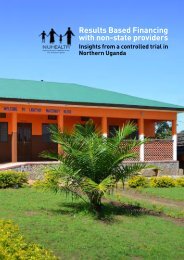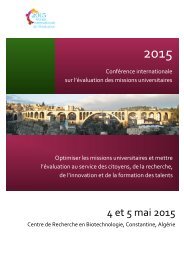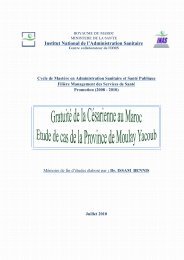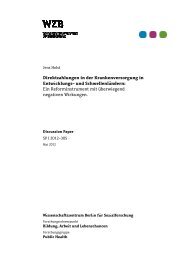Bellagio-Report-Vs-Apr-14
Bellagio-Report-Vs-Apr-14
Bellagio-Report-Vs-Apr-14
You also want an ePaper? Increase the reach of your titles
YUMPU automatically turns print PDFs into web optimized ePapers that Google loves.
host of pertinent national and regional 7 policiesand strategies that, if implemented, will shapedevelopment in Africa over the next decade.We, as African evaluators need to be able to (i)use these frameworks in our work, (ii) evaluatethem, and (iii) use professional experience andevaluation evidence to challenge and enrichthem (including, if appropriate, in the context ofa uniquely African developmental state).This means (among others) that Africanevaluators should understand better how toaddress the micro-macro disconnect. Thisincludes understanding better how to evaluatefor the scaling of development interventions,How to assess the merit, value and coherenceof the strategic initiatives at these differentlevels, how to consider the effect of the powerrelations and asymmetries related to their designand implementation, and how to help designlocally-owned M&E systems to support them.To date, evaluators and evaluation associationshave been largely absent from national andcontinent-wide discussions on criticaldevelopment issues. We do not have sufficientcredibility and profile to play a significant rolein such critical processes, and have yet to usenational efforts as well as the regional andglobal evaluation architecture to strengthen ourposition.African evaluators need to engage withinternational aid and other global policy andregimes that influence African development. Asnoted throughout this document, Africandevelopment is also strongly influenced byglobal policy regimes (trade, financialregulation, migration, security, etc.) 8 and byglobal politics – both of which are often not inAfrica’s best interests. Propaganda transmittedin the old and new media, and the fastmovement of news and information wheresoundbites take the place of reasoned argumentand evidence, have the potential to givecredence to interested perspectives anddistortions and overshadow more informed andaccurate analyses.. Their effects will grow asresource competition grows. African evaluators7 Such as the African Peer Review Mechanism (APRM);Comprehensive Africa Agriculture Development Programme(CAADP); Programme for Infrastructure Development inAfrica (PIDA); Consolidated Plan of Action for Science andTechnology; Environment Action Plan (EAP); MinimumIntegration Plan (MIP); African Action Plan: 2010-2015;African Mining Vision; AU Gender Policy; and more.8 Refer to the extensive writings of RobertPicciotto on this topic.need to have the capacities to understand thesedynamics and the profile that enables them toaddress them. This includes the ability toengage with global and regional forums thatinfluence important policy regimes, to evaluatetheir effect on African development, and toensure that both the (potential) positive andnegative consequences of global policies andstrategies and their implementation are wellunderstood and communicated to Africandecision-makers.African evaluators need to engage with adiversity of new actors and developmentfunding modalities. Power and financial shiftsin the world over the past decade have resultedin a very different development landscape.New, often non-Western models ofdevelopment and of development financinghave increased and are rapidly gaining traction.Aid percentages – both absolute and relative toother sources of funding - are going down whilefinancial flows from philanthropy, the privatesector and emerging economies are increasing.Foreign direct investment and instruments suchas impact investing and social developmentbonds are increasingly important. The Africanevaluation community is un(der)prepared forthese developments, and other actors such asauditors or major management consulting firmsare increasingly active in the evaluation of thesenew efforts .Two of the main challenges this poses to theevaluation community are a stronger focus on(i) the principle of “do no harm” and assessingunintended (negative) consequences; and (ii)making explicit the values that underpindevelopment and evaluation approaches.African evaluators need to engage with thebelief- and value-laden nature of bothdevelopment and evaluation. Citizen activism,the striving towards democratisation (in amanner that suits different developmentmodels), an increasing confidence in localsolutions, and assertions of pride in localidentity require African evaluators to examineand make explicit the beliefs, values andprinciples that underlie frameworks fordevelopment, as well as those that informevaluation, and their implications.This also highlights the importance of seekingindigenous approaches to, and models for,development and evaluation, while continuingto draw from the best international advances.Societies that value, for example, communityoriented,collective leadership and traditionalAfrican Thought Leaders Forum on Evaluation and Development, <strong>Bellagio</strong>, Nov 2012 28








